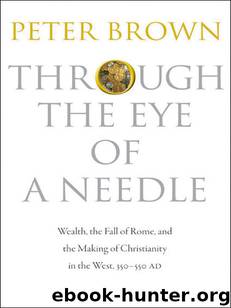Through the Eye of a Needle by Brown Peter

Author:Brown, Peter [Brown, Peter]
Language: eng
Format: epub
Publisher: Princeton University Press
Published: 2012-12-30T07:00:00+00:00
Cogita unitatem: Think unity
______
AUGUSTINE, WEALTH, AND THE CHURCH
In the 420s, both Julian and Augustine knew that large books mattered. In the increasingly dislocated conditions of the Latin West, imperial laws and ecclesiastical pronouncements had little power in themselves. Modern scholars (projecting back into the later empire the image of a modern totalitarian state) sometimes think that major controversies in early Christianity could be closed by an imperial ukase. They claim that state power alone tipped the balance between Augustine and Pelagius, with sad results for all future ages. Both Augustine and Julian knew better than that. They knew that imperial laws were only the opening shots. A bitter war of words to sway public opinion was bound to follow.
This was particularly the case when it came to the application of laws on religious matters. Despite the high-flown intolerance of their language, imperial edicts against heresy took second place to overriding, frankly secular concerns. What had always mattered most for the imperial government was the gigantic annual spasm connected with bringing in the taxes. Laws on religion were never imposed as resolutely as were laws on taxation.
If laws against heretics were unpopular or seemed irrelevant, they lacked bite. They were often ignored for decades on end. They had to have public opinion behind them if they were to be enforced. Public opinion meant, in effect, the opinion of the educated class who applied the laws as governors or as heads of their cities. Hence Julian’s choice of the recipients of some of his most vehement works. As courtiers and administrators, laypersons—and not the clergy—still held the keys of power. And laypersons worried about marriage.
They also worried about wealth. Augustine saw this clearly. His letters to powerful officials in the 420s placed great emphasis on his notion of the Catholic Church as an all-embracing institution and on the possibilities for the pious use of wealth within it. Images of the good Christian rich, which Augustine had already framed in his sermons of the 400s, were now passed on to high-up politicians and generals on active service. Through being summed up in carefully composed letters from around 417 onward (and not simply scattered as so many “seeds of the Word” in sermons), Augustine’s view of wealth came to be part of the common sense of wealth throughout the late Roman and early medieval West.
Put very briefly: Augustine rendered wealth unproblematic because its origins were held to be opaque. Like grace itself, wealth was a phenomenon Augustine had removed from human scrutiny. Wealth was among the gifts of which Saint Paul had written: But each one of you has his own gift from God (1 Cor. 7:7). Augustine wrote this (in 418) to Boniface, the future Count of Africa (the head of the armed forces in the region). He treated Boniface’s official rank, physical courage, and wealth as, all of them, equally gifts of God. They were gifts to be used in the service of the Catholic Church.30 To treat a political office and
Download
This site does not store any files on its server. We only index and link to content provided by other sites. Please contact the content providers to delete copyright contents if any and email us, we'll remove relevant links or contents immediately.
Joan of Arc by Mary Gordon(4112)
Victory over the Darkness by Neil T. Anderson(2868)
The Gnostic Gospels by Pagels Elaine(2531)
Devil, The by Almond Philip C(2333)
The Nativity by Geza Vermes(2230)
The Psychedelic Gospels: The Secret History of Hallucinogens in Christianity by Jerry B. Brown(2158)
Going Clear: Scientology, Hollywood, and the Prison of Belief by Lawrence Wright(1985)
Going Clear by Lawrence Wright(1968)
A TIME TO KEEP SILENCE by Patrick Leigh Fermor(1913)
Barking to the Choir by Gregory Boyle(1822)
Old Testament History by John H. Sailhamer(1816)
Augustine: Conversions to Confessions by Robin Lane Fox(1773)
A History of the Franks by Gregory of Tours(1729)
A Prophet with Honor by William C. Martin(1725)
The Bible Doesn't Say That by Dr. Joel M. Hoffman(1681)
The Knights Templar by Sean Martin(1655)
by Christianity & Islam(1636)
The Source by James A. Michener(1615)
The Amish by Steven M. Nolt(1574)
